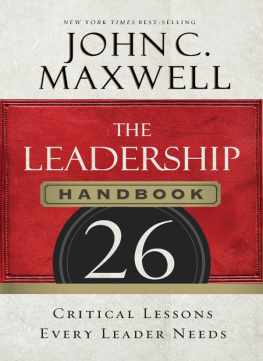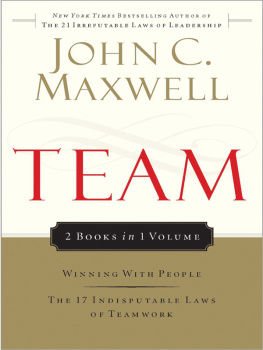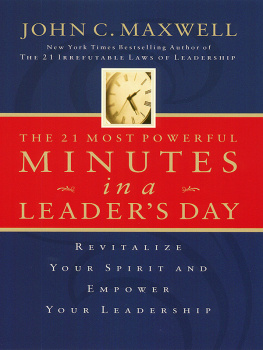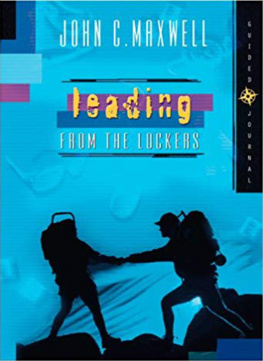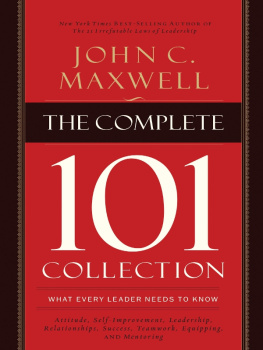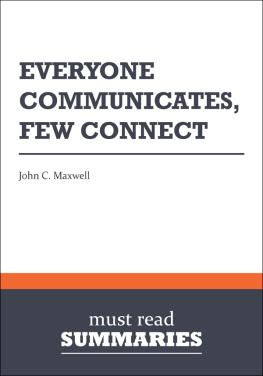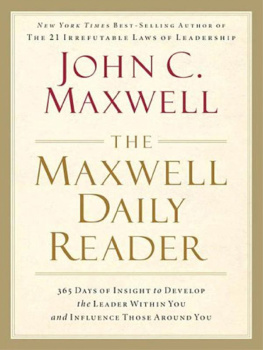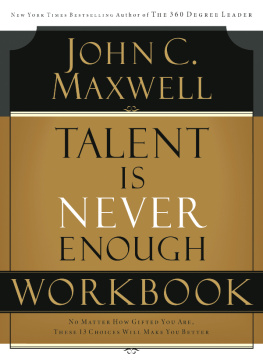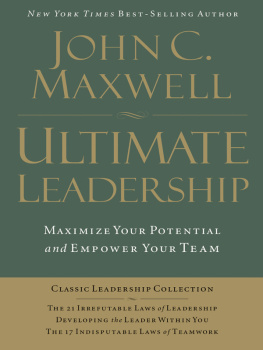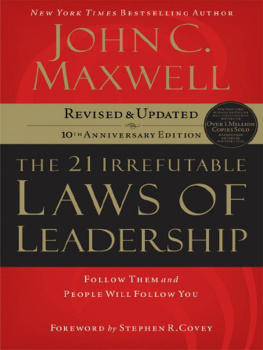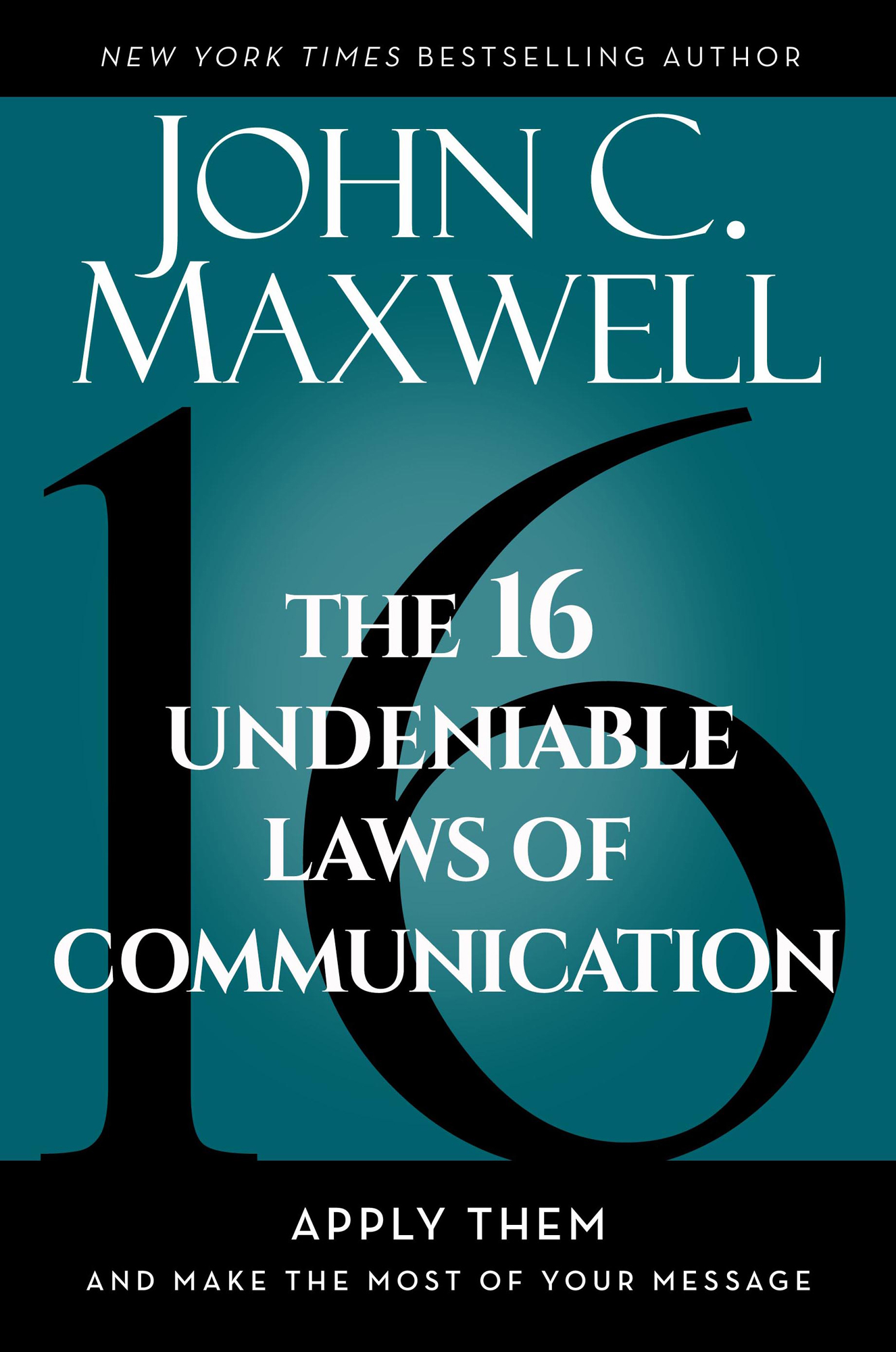Contents
Guide
New York Times Bestselling Author
John C. Maxwell
The 16 Undeniable Laws of Communication
Apply Them and Make the Most of Your Message
This book is dedicated to John Vereecken.
For twenty-five years you and Karla have been helping me in Latin America.
You are a
Leader of Leaders
Communicator Extraordinaire
Builder of Teams
Caster of Vision
and
an Incredible Friend.
You, Karla, and Susi have expanded my calling to transform nations beyond anything I ever could have imagined.
I can never thank you enough!
A CKNOWLEDGMENT
I WANT TO SAY THANK you to Charlie Wetzel and the rest of the team who assisted me with the formation and publication of this book. Thanks also to the people in my organizations who support it. You all add incredible value to me, which allows me to add value to others. Together, were making a difference!
I NTRODUCTION Everyone Has a Message
W HAT DO YOU WANT TO say? Will you be able to deliver that message? When you do, will you communicate well enough that it gets through and accomplishes what you want it to?
Everyone has a message. It may be a message for the moment or the message of a lifetime. You may need to communicate the vision for your company. Or want to speak at the PTA meetings at your childs school. Or wow your high school or college classmates with a great presentation. Or present the quarterly report without putting your colleagues to sleep.
Or present a product. Or run for office. Or preach a sermon. Or make your living by becoming a professional speaker. Or maybe you just want to be able to share your heart with members of a small group.
If your desire is to share any kind of message, you want to be able to communicate it well. You want to be able to make the most of your message. Can you?
According to Harvard Business Review, The number one criteria for advancement and promotion for professionals is an ability to communicate effectively.
Yet at the same time, public speaking, which I define as communicating a message to a group of two or more people, intimidates a lot of people. In one of his routines, stand-up comedian Jerry Seinfeld said, I saw a study that said speaking in front of a crowd is considered the number one fear of the average person. I found that amazing. Number two was death. Death is number two? This means, to the average person, if you have to be at a funeral, you would rather be in the casket than doing the eulogy.
It doesnt have to be that way.
I believe most of the people who fear communicating to a group of people avoid doing it because they dont want to do it poorly; they worry they will fail. I know this because in 2011, I founded the Maxwell Leadership Team, a company that trains people as coaches and speakers. When people come to receive their training, they are required to deliver a five-minute message to a small group of fellow trainees at their table. Every person giving their talk wants to do well. They have a message they want to deliver, and theyre anxious to learn how to be effective communicators. But theyre never as good as they could be. Thats why we train them.
When it comes to communication, everyone stumbles in the beginning. Ive spoken more than thirteen thousand times in my speaking career, and Im currently at the top of my game. But my first experience speaking in public was terrible. (Youll read about that in the book.) Why wasnt I any good? Because nobodys good the first time! Like anything else, speaking has a learning curve. But if you have solid principles to guide your growth, you can improve quickly. And every time you speak, you get better. As Hayley Hawthorne said, Mastering communication skills isnt something that can be done overnight. Developing communication skills is a journey that takes time. But I can tell you this: the journey is worth every step!
Ive written The 16 Undeniable Laws of Communication to help anyone give a talk to others. Just as I worked to help people with leadership, teamwork, and personal growth with my other Laws books, I want to help you with communication with this one. And what was true of those laws of leadership, teamwork, and growth is also true of these:
- 1. The laws can be learned. Some are easier to understand and apply than others, but every one can be acquired.
- 2. The laws can stand alone. Each law complements all the others, but you dont need to know one to learn another.
- 3. The laws carry consequences with them. Apply the laws, and you will make the most of your message and increase your influence. Violate or ignore them, and you will not be effective in communicating to others.
- 4. The laws are timeless. Whether youre young or old, experienced or inexperienced, the laws apply just the same. They applied to your grandparents, and they will apply to your great-grandchildren.
- 5. The laws are the foundation of good communication. Once you learn the principles, you will have to practice them and apply them to your life. If you do, you will be a better communicator.
Billionaire businessman and philanthropist Warren Buffett said, The one easy way to become worth 50 percent more than you are nowat leastis to hone your communication skillsboth written and verbal.
Whether you want to lead a business, teach a class, sell a product, preach a sermon, train a staff member, coach a team, earn a degree, run a nonprofit, or speak at a neighborhood meeting, learning to communicate better will help you. Learn and apply the Laws of Communication, and you will make the most of your message. And that will help you succeed in everything you do.
WHO SAYS IT
T HE L AW OF C REDIBILITY Your Most Effective Message Is the One You Live
W HAT WOULD HAVE HAPPENED IF the I Have a Dream speech during the March on Washington in 1963 had been delivered by segregationist governor George Wallace instead of Martin Luther King Jr.? Or if the Gettysburg Address in 1863 had been made by Jefferson Davis, president of the Confederacy, instead of Abraham Lincoln? Or if the Sermon on the Mount had been preached not by Jesus Christ but by Judas Iscariot? Or Pontius Pilate?
How would the people listening have responded? Would they have rioted? Would they have attacked the speaker? Would they have simply walked away? At the very least, their messages would have fallen flat. And their words would have been forgotten. Why? Because the noble, inspiring, memorable, life-impacting words in those messages would not have matched the people who spoke them. When it comes to communication, a disconnection like that doesnt work, because your most effective message is the one you live. Anything else is just empty words. That is the Law of Credibility.
FIRST FOR A REASON
This first law of communication is not more important than the others, but theres still a reason its first. As a communicator, if you dont learn and live this law, the others wont help you much. Who you are gives credibility to everything you say. As my friend Jamie Kern Lima, the founder of IT Cosmetics, says in her book Believe It, Authenticity doesnt automatically guarantee success but inauthenticity guarantees failure. If you speak words you do not live, you lack authenticity and your communication will not be successful.


